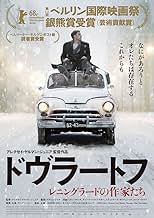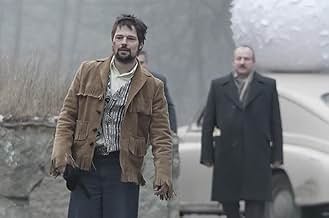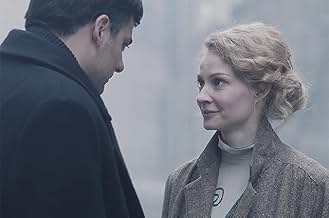AVALIAÇÃO DA IMDb
6,4/10
2,3 mil
SUA AVALIAÇÃO
Adicionar um enredo no seu idiomaThe film actions unfold in 1971, telling about the four days of life of famous writer Sergei Dovlatov. The film raises the eternal issue of the Russian and European culture - the issue of mo... Ler tudoThe film actions unfold in 1971, telling about the four days of life of famous writer Sergei Dovlatov. The film raises the eternal issue of the Russian and European culture - the issue of moral choice.The film actions unfold in 1971, telling about the four days of life of famous writer Sergei Dovlatov. The film raises the eternal issue of the Russian and European culture - the issue of moral choice.
- Direção
- Roteiristas
- Artistas
- Prêmios
- 5 vitórias e 11 indicações no total
Danila Kozlovsky
- David
- (as Danila Kozlovskiy)
Tamar Hovhannisyan
- Nora Dovlatova - Sergei Dovlatov mother
- (as Tamara Oganesyan)
Anna Yekaterininskaya
- Deputy director of the plant
- (as Anna Ekaterininskaya)
Sergei Tolstov
- Factory Newspaper Editor
- (as Sergey Tolstov)
Maria Järvenhelmi
- Finnish tourist
- (as Mari Yarvinkhelmi)
Nikolai Shatokhin
- Dovlatov's friend
- (as Nikolay Shatokhin)
- Director
- Roteiristas
- Elenco e equipe completos
- Produção, bilheteria e muito mais no IMDbPro
Avaliações em destaque
It's not an easy movie for the viewer. However, it is an addictive cinema. The film is a biography of a writer who did not live to see his work published during his lifetime, so it focuses on impotence, unfulfillment and bitterness. A few days from Dovlatov's life, which we observe on the screen, is therefore a pretext for showing his everyday work - the attempts to publish a text instead of a little ambitious journalistic texts, showing his family and friends, the bohemian environment of Leningrad / St. Petersburg.
The film has a very calm rhythm, it is beautifully photographed and well played. The central figure is the ubiquitous Milan Maric (strikingly similar to Sergei Dovlatov), but although he is present on the screen in almost every scene, he does not dominate history and other characters.
Definitely worth seeing is a film for all those who are interested in showing the creative process on screen or in the reality of life in Soviet Russia.
The film has a very calm rhythm, it is beautifully photographed and well played. The central figure is the ubiquitous Milan Maric (strikingly similar to Sergei Dovlatov), but although he is present on the screen in almost every scene, he does not dominate history and other characters.
Definitely worth seeing is a film for all those who are interested in showing the creative process on screen or in the reality of life in Soviet Russia.
I have to admit I was shocked by the low quality of the acting. Most conversations (and in this movie there are plenty of those) seem really unnatural and awkward, most actors seem to recite their lines as if they were reading them from a paper... There is neither chemistry, connection nor emotion between the actors whatsoever: they seem to be talking past each other instead of to each other (maybe on some occasions it's deliberate, but this is happening throughout the whole movie, which makes it completely absurd.. ). Female characters have no importance on their own terms - they are only there to serve as background to the male characters. Weirdly, all females have bags under their eyes... Slight positives: the main character is mildly charismatic and the movie gives you a glimpse into how live could have been during the seventies in Russia (no idea if it's accurate enough). However, overall the movie is quite a waste of time, unfortunately.
The female roles in this film were stereotypical, was there not even one talented female writer in their group in that time? The women are either in love, in awe or supportive, none of them has an authentic plan of their own, the only female remotely doing something artistic, the actrice, is a sell out. But the men on the other hand are all hero's standing their ground.. how pathetic to enforce these harmful and dishonest stereotypes..
In Soviet times, no one needed talent. Mediocrity ruled the ball, with talented people suppressed, gifted ones even harder - having been afraid of, like a primeval creature is scared and therefore responds aggressively to anything inexplicable. Those talented, having no way of expression, finding no audience, reading audience first of all, would fall into nothingness unless fled abroad or drowned in vodka. This was consistent and gave no chances to artists in developing anything worth reading. But the talent was nonetheless stronger and many infiltrated the history of literature. What Soviet leaders promulgated was easily captured locally, in chief editor's offices, writers' union, even by sellers of forbidden books trembling for their lives and freedom. Total ignorance, straightforwardness, and ultimate desire to crush any individuality made its way to exterminating any roots of artistic calling that has been so strong in the Russian literature before Soviets. That's when the genocide started whose fruits we have along, with the post-Soviet ravenous lust for money having superimposed and inflicted the last strike.
Across the ocean, the world saw beatniks to be the last whose nervous, preagonic howl loomed over the world of big literature, eventually resulting in poor language and rhetoric of late post-modernism with its too much relying on commercialization and losing the essence. What we have now is the outcome of how polar types of societies evolved to squeeze profound art from both sides leaving no place for genius looking for an exit of its artistic power. These days, there is no room to even write a word unless it brings profits to the publisher.
Both Soviet masses and elites were not ready to new trends having no desire to read about trifles rather than something big. Leaving general all-humanity topics for small things was a border between modernism and post-modernism and was for sure better perceived in developed countries rather than those built by narrow thinking of power-holding minorities. Brodsky finally left for the US to be honored a Noble prize, which may be argued about as a politically motivated act, but no one doubted his talents except for those who were afraid that his literary actions may rock the boat of stable way to a better future (which we may very well observe now as well, huh). Whether they did understand that their work is used for political games in this new world, that we don't know, but what we got in the end is a collapse of literature as we, or previous generations, knew it. Through years of struggle, true art has lost its positions and we'll never see it as before again, with the last man of letters having perished at the turn of the century.
As for Dovlatov, Ernst Neschastny once wrote: "He was drinking as hell, drowning himself in alcohol, as generations of Russian men before him - dark Russian alcoholism with the only purpose of slowly killing themselves, reaching the end they were seeking so much, trying to elude the reality they couldn't fix or live in." This is what we don't see in the film, but what we should know. Being unacknowledged throughout his life and finding glory only after his death, Dovlatov remains an image of how the system mutilates fates and lives. Those who he called "low and pathetic people" were the one responsible for their country and its future that we have now. They are to be blamed for narrow-mindedness, vanity, stupidity, thirst for power, and personal ambitions. After all these years, we still see it in federation-level decision makers.
The closing scene is of course the most important one showing how hard it is, emotionally, socially, and physically, to overcome the pressures coming both from inside and outside and follow your way. "Don't listen to no one, your books are your business. It's going to be hard but you will find inner power" sounds like parting words to every artist in doubt. And being such, Dovlatov makes a final line concluding his existence and, perhaps, alluding, in part, to any human's life: "Still we exist, always drinking, in worn out shoes, poor, and sometimes talented. We still exist. We are and we will be. The only way not to lose yourself is to go through that thorny way of hopes, disappointments, and losses. "
Dovlatov is a good biographical film about a famous Russian writer. The majority of biographical films are divided into 2 types: either the film tells the whole life of a person or in detail about some period of life. It is type 2 that I consider preferable, as in 2-2.5 hours of conditional timing it is difficult to lay down a whole life of a person. Dovlatov is just such a film, the action of the film unfolds in just a couple of days 1971. Transfer of an era, life and life of Leningrad of the 1970th years simply 10/10. One of the best films about the period of Brezhnev stagnation of society. Just a good film, in which there are only dialogues and internal conflict of the writer, who alone opposes the state structure.
Você sabia?
- ConexõesFeatures Romantyczni (1970)
Principais escolhas
Faça login para avaliar e ver a lista de recomendações personalizadas
- How long is Dovlatov?Fornecido pela Alexa
Detalhes
- Data de lançamento
- Países de origem
- Centrais de atendimento oficiais
- Idiomas
- Também conhecido como
- 文字慾
- Locações de filme
- Empresas de produção
- Consulte mais créditos da empresa na IMDbPro
Bilheteria
- Faturamento bruto mundial
- US$ 2.187.653
- Tempo de duração2 horas 6 minutos
Contribua para esta página
Sugerir uma alteração ou adicionar conteúdo ausente


![Assistir a Trailer [OVS]](https://m.media-amazon.com/images/M/MV5BZjQ0ODcwYTMtZmU2OC00ZDFlLTkyZTgtY2Y0NDFjMjJmNmZlXkEyXkFqcGdeQXRyYW5zY29kZS13b3JrZmxvdw@@._V1_QL75_UX500_CR0)


















